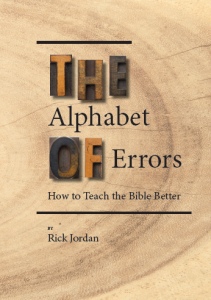More often than I like, I read Bible passages I don’t like.
I find that my friends face this same dilemma. We love God’s Word(s) – except for some of them. I asked my Facebook friends, “What story or saying in the Bible do you wish were not there?” Here are some reasons we are uncomfortable:
Sin
Sin separates me from God and from God’s dream for my life and God’s dream for the world. Sometimes I read a Bible passage and the Holy Spirit says, “Rick, this means you.” I need to confess that I have done something to damage my relationship with God or others. Or, that I have not done something I should have that would strengthen my relationship with God or others. Alexa Hack said, “I have a love/hate relationship with the Prodigal Son. It is a beautiful story in theory, but most of the time I find my human tendency toward jealousy and resentment has me relating more with the first son who does everything right.” This is a good kind of discomfort.

Complacency
Some words make me uncomfortable because the Holy Spirit knows I need to be uncomfortable. If I am content with my spiritual life I am not growing. If I am not growing – becoming more like Christ – I am not producing the healthy spiritual fruit I was created to produce.

Sometimes, threatening stories are used to shake us out of complacency. Chip Brock doesn’t like “the story of the bridesmaids. To hear Jesus say to me, ‘Go away. I do not know you!’ Gives me chills and not the good kind.” Michael Jordan doesn’t like “Matthew 7:22 Many will stand before Jesus stating ‘look what we did in Your name.’ And they won’t make it. Very hard to take that in. Very scary.” This is also a good kind of discomfort. It makes us move.
Then, the other passages
There are other passages, however, that I simply do not like. They are irrelevant, out of date, out of touch, and harmful. They praise the wrong people, promote the wrong values, and prophecy an obscure message. Tyler Tankersley asks, “has the Book of Revelation caused more harm or more good? I’m just saying.”
Most of these passages do not make it into the lectionary, so they can be ignored from the pulpit. Most do not make it into the scope and sequence of moderate to progressive Bible study curriculum, so they can be ignored in the classroom.
If you are reading through the Bible, however, they must be read. If you are looking for a reason to justify your phobia or hatred of a particular group, you love these kinds of passages. Likewise, if you want to justify your moral or ethical standards or even a bizarre theological interpretation, you can find something in the Bible to back you up.
More passages we’d like to rip out

Here are some others’ responses:
“Abraham’s being asked to sacrifice Isaac. As a parent, it strikes me as pure evil.”
“The young man (presumably John Mark) who ran off naked, I mean really, why is this information necessary?”
“Jesus cursing the fig tree.”
“The guys hired at the end of the day get paid as much as the guys hired at the beginning. Are you kidding me?”
“Jacob being blessed. He was just such a rotten brother, son and father… it doesn’t seem right.”
“Job. I feel like God pulled the rug out from under him.”
“1 Timothy 2:11-12 is a verse I think has caused so much harm and continues today. ‘Let a woman learn quietly with all submissiveness. I do not permit a woman to teach or to exercise authority over a man; rather, she is to remain quiet.’”
Mine include some of these and dozens more. “Why would God do that? Why would Jesus teach that? Why did the early church leaders write that?”
An ancient problem
Twenty-first century Christians are not the first to struggle with these awkward passages. Peter even dings Paul in one of his letters, noting that Paul is hard to understand. Yet Peter does not say, “therefore, ignore those hard passages.” Indeed, Peter says the opposite – do not take scripture you are uncomfortable with and twist it to your benefit.
“This is what our beloved brother Paul also wrote to you with the wisdom God gave him— speaking of these things in all of his letters. Some of his comments are hard to understand, and those who are ignorant and unstable have twisted his letters to mean something quite different, just as they do with other parts of Scripture. And this will result in their destruction.” (2 Peter 3:15b-16 NLT)
Things are different today
Cultural, social, and political contexts are not always understood by persons 2000+ years after a piece is written. Does this mean we can assume our society is more enlightened? Should we assume that first century Christians wrote what is eternally true?
Answers from the English Lit Department

A basic problem is the lack of understanding about how narratives work. For example, Paul Borgman’s book, Genesis: The Story We Haven’t Heard has helped me understand the Abraham/Isaac story which several people mentioned. (I interviewed Paul Borgman recently and will post that on the greatbibleteachers.com website soon.)
As an English professor with a PhD in the art of stories, Borgman offers some profound insight. He begins his Bible as Literature class with the story of Abraham lifting his knife against his only son. His students don’t like this story. “And I’ll respond, ‘What has this scene got to do with anything else in the story?’ They’ll look at me as if I asked how this episode exposes the secret of atomic energy…. There have been six prior visits between Abraham and God. Those six visits are, in key respects, very much like this seventh one…
“Without noting the pattern of these prior visits between the two speakers, we will be lost when approaching God’s request for letting go of a son. It will seem bizarre, an archaic voice out of the blue asking for the ridiculous. In fact, there is something wonderful in this last test for Abraham, as there is for God. These visits are like a dance between two partners, a dance that becomes more and more complex each time out on the floor.”1
Let’s talk about it
I interviewed another scholar, Frank Spina. (That interview will be posted soon, too.) He became fascinated with the Biblical stories of God using outsiders to teach, reach, and save the insiders.2 He and I talked about how these stories are to be conversation starters, as are many seemingly contradictory teachings.

For example, the Bible is clear in one text that Moabites are excluded from God’s kingdom. “As long as you live, you must never promote the welfare and prosperity of the Ammonites or Moabites.” (Deuteronomy 23:6) Yet, Ruth, a Moabite, finds herself in the midst of a hospitable Bethlehem and eventually in the lineage of Jesus. Are Moabites enemies? Or, are they part of God’s meta-story to bless all people? The book of Ruth is a conversation starter.
Put away the scissors
I am trying to be more patient with passages with which I do not approve. Maybe they are included for reasons I cannot understand. Maybe I need to read disagreeable stories in the comprehensive story rather than pluck one out of its narrative context. Maybe I need to be open to uncomfortable conversations. Maybe I won’t rip these passages out of my Bible, after all.
- Paul Borgman, Genesis: The Story We Haven’t Heard (Downers Grove, IL: InterVarsity Press, 2001), 12-13. [↩]
- Frank Anthony Spina, The Faith of the Outsider: Exclusion and Inclusion in the Biblical Story (Grand Rapids: Wm. B. Eerdmans Publishing Co., 2005). [↩]

